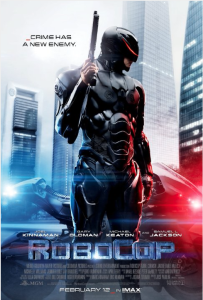
SteveMcCabe.net...
...being the online presence of Steve McCabe himself
On Robocop, and how not to stuff up a remake
February 6th, 2014I’m not, usually, a huge fan of the massive-explosions-and-little-else end of the science-fiction spectrum. Robocop, then, the remake of Paul Verhoeven’s 1987 original, didn’t climb to the very top of my “I simply have to see this film” list, and I went, primarily, because I was offered a ticket to last night’s press screening at Event Cinemas‘ IMAX cinema on Queen Street (thanks, Sarah, by the way). And the consensus among press types as we all left the viewing was, well, they really didn’t stuff that up as badly as they might. And that, let’s be honest, simply isn’t fair to the film. It was, surprisingly for its genre, really rather entertaining.
The story is quite straightforward, and cleaves reasonably closely to its source material — Murphy (he has a first name, Alex, but, as is conventional in films like this, he’s invariably just known by his surname), a Detroit detective, is injured most grievously in an attempt on his life by a villain he is close to collaring, and what’s left of him, which really isn’t very much at all, is rebuilt into a robot by GreatBigEvilCorp in an attempt to circumvent a new law banning the use of law-enforcement robots on the streets of America. The story unfolds reasonably predictably, with a fairly obvious and foreseeable set of tropes and no shortage of big, bangy loudnesses. The film was fun to look at, of course. IMAX is a fantastic way to watch a film like this, and Event Cinemas’ rendering was up to the task, with sound ratcheted up to seismically worrying levels and explosions that were both heard and felt at a quite deeply visceral level.
But if that’s all this film were, then I would likely have lost interest within the first half-hour. There was, however, an awful lot more to it than this. The film is anchored by a quite exceptional turn by Samuel L Jackson as Pat Novak, a news commentator presenting a show called The Novak Element (a rather clumsy and obvious nod to Fox’s The O’Reilly Factor). Jackson, definitely the high point of the show, has clearly been watching the Hunger Games films closely; his character owes more than a nod of thanks to Stanley Tucci’s Caesar Flickerman. Gary Oldman is characteristically outstanding as Dennett Norton, the robotics genius who transforms Murphy into a tin machine; I knew, before the film started, that Oldman appeared in it, but didn’t realise, until the credits rolled, that he had played Norton — one forgets, sometimes, simply because of how effortlessly he does it, just how phenomenal an actor Oldman is. Similarly excellent is Michael Keaton as Raymond Sellars, the Evil Genius behind the Great Big Evil Corporation, playing Sellars as seemingly innocent but ultimately profoundly sinister. Also worth a mention is Jackie Earle Haley, enjoyably hateful as the sergeant-major of GreatBigEvilCorp who insists that Robocop simply can’t function on the same level as a pure robot.
More disappointing is Joel Kinnaman as Murphy. After his metamorphosis, it is entirely appropriate that Murphy/Robocop would be a machine-like presence, a cipher — that is, after all, a significant plot strand — and Kinnaman’s post-transformation performance is suitably deadpan. But as Murphy the whole man, Kinnaman is similarly flat — I’m told he’s very good in The Killing, and I’m sure he’s quite superb in his native Swedish, but in Robocop, he was one-dimensionally gruff and, frankly, dull. It’s hard to portray his roboticisation as robbing him of a richness of character and depth when he lacks those very attributes to begin with.
Similarly jarring is the slightly clumsy and heavy-handed political commentary. Jackson’s Novak, a toe-curlingly flag-waving American, will play well among the right wing of American audiences, but will likely come across as a parody in The Rest of The World. The opening sequence, a robot patrol through an American-occupied Tehran, could be read as either a cautionary tale of the dangers of American hubris, or as a wet dream for the America-as-world-police brigade. Either way, while a brilliantly-shot set piece, it does feel a little bolted-on. Similarly unnecessary is the Chinamen-in-rice-fields sequence outside the GreatBigEvilCorp factory located, for no apparent reason, somewhere in 19th-century China.
At two hours, Robocop manages not to outstay its welcome. The direction by Brazilian-born José Padilha is workmanlike and unexceptional — the film skips along pleasantly, with enough bangy bangs to satisfy that segment of the audience that requires such things, but even the climax, which, by genre necessity features a goodly smattering of explosions, manages a few lines of dialogue to avoid simply descending into boom-fest.
Not, then, the worst film I’ve ever seen — that honour will likely ever be held by Wim Wenders’ truly execrable Wings of Desire. Nor, for that matter, is it the worst film with a Verhoeven connection — I can’t imagine anything taking that title from the magnificently dreadful Showgirls. It is, instead, perfectly disposable, but perfectly enjoyable and entertaining. I won’t bother seeing it again, even, I don’t think, if I’m offered another free IMAX ticket. But I’m glad I went last night, if only to see that they really didn’t stuff it up.

Leave a Reply